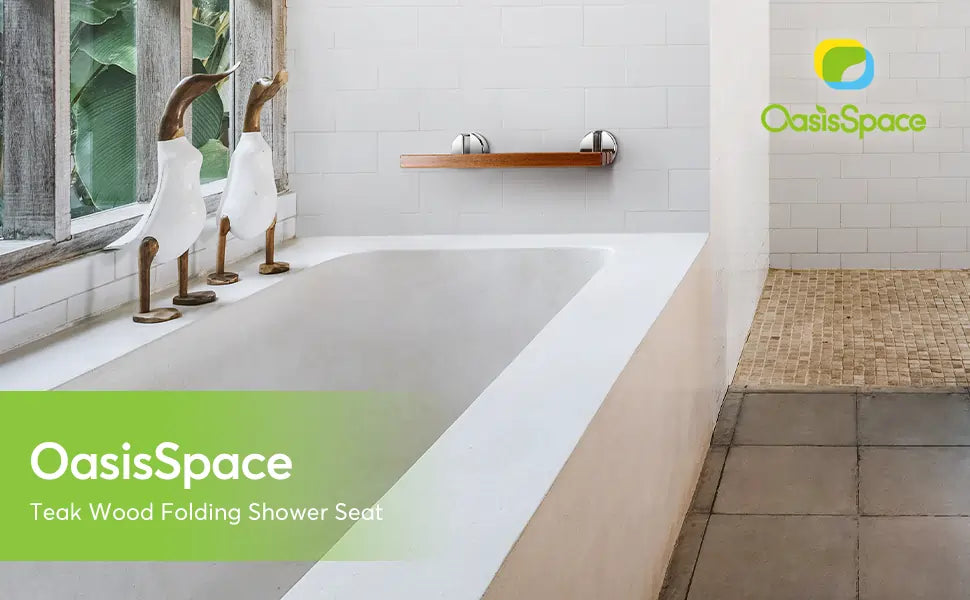
Best Material for Shower Chair/ Bench
Greetings! Let's embark on a discourse about an often-overlooked yet pivotal element of your washroom: the humble shower Chair/bench.
This unassuming hero of your ablutions isn't merely a perch; it's a confluence of safety, comfort, and your individual flair.
Whether you are looking for a place to rest in the shower or looking for a suitable bathroom chair for the beauty of your bathroom. You need to first understand the materials of different bathroom stools, because only then can you find the one that is more suitable for you.
So let’s take a look.
The Role and Importance of Shower Benches
Comfort and Safety Considerations
A shower chair or shower bench is not just a stool to sit on, it is a pleasure. For people with limited mobility or the elderly, it can provide a seat while taking a shower without slipping and tiring. For others, it provides a convenient place to shave their legs and more. The material of the bathroom chair determines its comfort, anti-slip and overall safety.
Aesthetics and Design Aspects
In addition to functionality, shower stools made of different materials can also bring unexpected design and beauty. It can act as a statement piece that ties together the design elements of your space. Whether you're aiming for a spa-like oasis or a modern, sleek look, a shower stool can complement your desired aesthetic.
Key Factors in Evaluating Shower Bench Materials
Staying Strong Against Water
When it comes to shower benches, the first thing to think about is how well the material can handle water. You want something that won’t give in to a bit of dampness – no warping, no mold, just sturdy and clean.
Easy Does It with Cleaning
Let’s face it, no one loves extra cleaning. So, a good shower bench material should be low-fuss, easy to wipe down, and not need a ton of special care to keep it looking fresh.
Durability for Peace of Mind
sturdy material is vital, especially when safety is a concern. You need a bench that can support weight, withstand daily use, and still look good as new. It’s about trust – knowing your bench won’t let you down.
Thinking Green
Choosing a material that’s kind to the planet is more important than ever. Eco-friendly choices often bring more than just sustainability; they bring a piece of nature’s calm to your bathroom space.
Popular Material Options for Shower Benches
What comes next is the point. Let’s take a look at what materials bathroom chairs or stools are usually made of, and then look at their features, pros and cons, and prices.
1. Teak Shower Chair: The Timeless Classic
- Features: Teak wood is produced in the tropics and has a natural oil layer, so it is very waterproof. Its strong fibers resist moisture and rot.
- Pros: Waterproof and not prone to mold, can be used for a long time. In addition, it is natural enough and beautiful enough.
- Cons: The price is a bit expensive. In addition, it also requires occasional regular maintenance to maintain a good appearance.
- Price: More expensive than bamboo shower chairs. Generally above $100.
2. Bamboo Shower Bench: The Eco-Warrior
- Features: Bamboo stands as a testament to sustainability. It's a rapidly renewable resource, sprouting back with vigor after harvesting.
- Pros: Cheap, lightweight, and sturdy. It has a modern look while being kind to Mother Earth.
- Cons: More prone to mold. Ongoing maintenance is required to prevent cracking and maintain its moisture resistance.
- Price: More affordable than teak, bamboo is a wallet-friendly choice for the eco-conscious. Around $40~90.
3. Aluminum Shower Chair: The Modern Maverick
- Features: Aluminum, with its sleek and clean lines, brings a modern twist to your bathroom. It's impervious to water and scoffs at rust.
- Pros: Low maintenance and lightweight, aluminum benches are easy to maneuver and clean, making them a practical choice.
- Cons: Its metallic nature can feel cold and less inviting compared to wood. It may also clash with certain bathroom decor styles.
- Price: Mid-range, offering a balance between cost and modern aesthetics.Around $35~70.
4. Stainless Steel Shower Chair: The Contemporary Titan
- Features: Boasting industrial strength and a polished finish, stainless steel is the epitome of modern bathroom chic.
- Pros: It’s a champion against corrosion and wear, and its reflective surface adds a touch of elegance.
- Cons: Like aluminum, it can feel cold to the touch and may require additional mats or cushions for comfort.
- Price: Generally aligns with mid to high range, given its durability and sleek appearance. Generally above $150.
5. Plastic Shower Stool: The Practical Choice
- Features: Plastic benches offer a rainbow of color options and are inherently water-resistant and lightweight.
- Pros: They are the go-to for easy cleaning, affordability, and versatility in design.
- Cons: Not Eco friendly, lacks the beauty of natural materials, and has a shorter service life.
- Price: Typically the most budget-friendly option, perfect for those who prioritize practicality and cost-effectiveness.Around $10~50
6. Composite Materials Shower Seat: The Innovative Fusion
- Features: They are made from a variety of materials, often combining the best properties of their ingredients, such as the durability of aluminum and the water resistance of plastic.
- Pros: Composite benches are a playground of possibilities, offering varied textures and designs.
- Cons: Some composites can be expensive, and their unique compositions might require specific care.
- Price: Varies widely based on the composition and brand, often landing in the mid to high price range. Around $35~130
Different Material of Shower Chairs Quick Compare
| Type | Features | Pros | Cons | Price Range |
|---|---|---|---|---|
| Teak Shower Chair | Tropically produced, natural oil layer, waterproof. | Waterproof, durable, beautiful. | Expensive, regular maintenance. | Above $100 |
| Bamboo Shower Bench | Rapidly renewable, sustainable. | Affordable, lightweight, eco-friendly. | Prone to mold, maintenance needed. | $40~$90 |
| Aluminum Shower Chair | Modern, sleek, water and rust-resistant. | Low maintenance, lightweight. | Can feel cold, may not fit all decors. | $35~$70 |
| Stainless Steel Shower Chair | Industrial strength, polished finish. | Corrosion-resistant, elegant. | Cold touch, may need cushions. | Above $150 |
| Plastic Shower Stool | Color variety, water-resistant, lightweight. | Easy cleaning, affordable, versatile. | Not eco-friendly, less durable. | $10~$50 |
| Composite Materials Shower Seat | Combines multiple materials, durable and water-resistant. | Innovative design, varied textures. | Can be expensive, special care. | $35~$130 |
Conclusion
How to choose the best material for a shower chair or shower stool? I believe you already have the answer after reading the above article. Choosing the best materials is not a hard-and-fast thing and requires balancing your personal style, functional needs, and budget.
Think about the atmosphere you want to create. Do you desire a natural, warm feel or a sleek, modern look? Consider the practical question, who will use the bench? Look at your wallet again. Is it cheap so it won’t last long, or is it expensive so you can use it for a long time?
You can make the final decision based on your personal needs.
Remember, the right choice can enhance not only the functionality of your bathroom, but also its soul, making every shower a more enjoyable, safe, and aesthetically pleasing experience.
Recommend Products
-
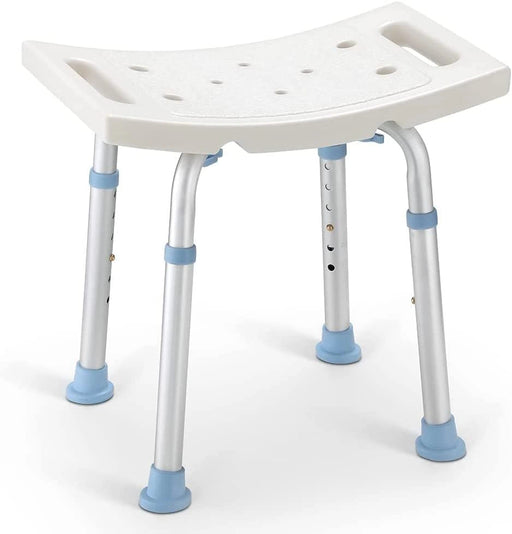 Sale
Sale
Standard - 300LBS Capacity Shower Stool
Original price $51.99From Original price $28.99Original price $51.99Current price $28.99From $28.99Current price $28.99OasisSpace Medical Square Shower Stool for Bathtub OasisSpace Square Shower Stool for Bathtub is approved as the highest standard(FDA) for medical...
View full detailsSaleOriginal price $51.99From Original price $28.99Original price $51.99Current price $28.99From $28.99Current price $28.99 -
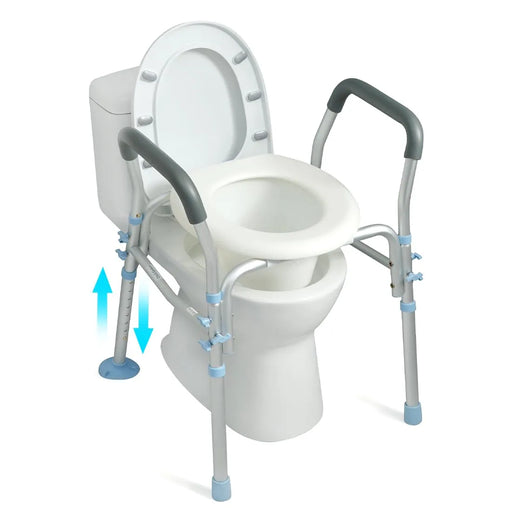 Sale
Sale
300LBS Capacity Raised Toilet Seat with Arms
Original price $120.99From Original price $69.99Original price $120.99Current price $69.99From $69.99Current price $69.99OasisSpace Raised Toilet Seat with Arms - Safe and Convenient OasisSpace Raised Toilet Seat with Arms provides stable support for users to sit dow...
View full detailsSaleOriginal price $120.99From Original price $69.99Original price $120.99Current price $69.99From $69.99Current price $69.99 -
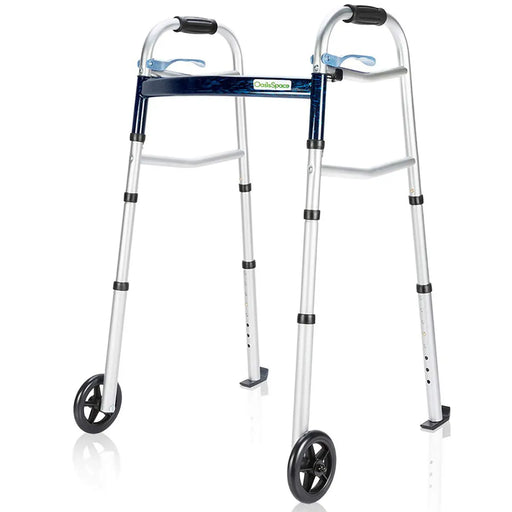
350LBS Capacity 2 Wheel Walker
From Original price $39.99Original price$39.99From $39.99Current price $39.99Product Advantages OasisSpace's 350LBS Capacity walker offers a fusion of lightweight design and sturdy support, crafted from high-grade anodized ...
View full detailsFrom Original price $39.99Original price$39.99From $39.99Current price $39.99 -
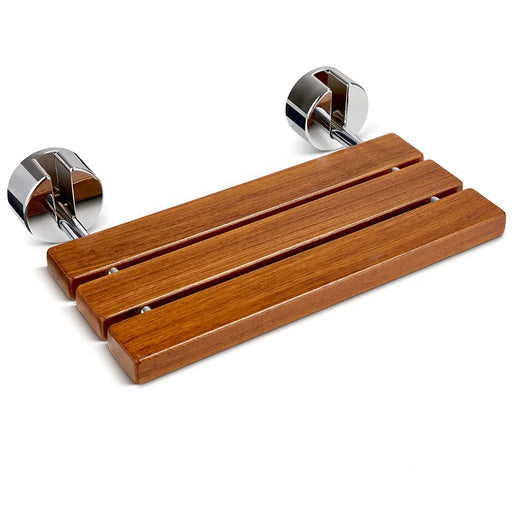
Wall Mounted - 400LBS Capacity Teak Folding Shower Seat
From Original price $131.99Original price$131.99From $131.99Current price $131.99Advantages OasisSpace Teak Wall-Mounted Shower Seat adopts a folding design, which can save space to the greatest extent and can be folded up at a...
View full detailsFrom Original price $131.99Original price$131.99From $131.99Current price $131.99 -
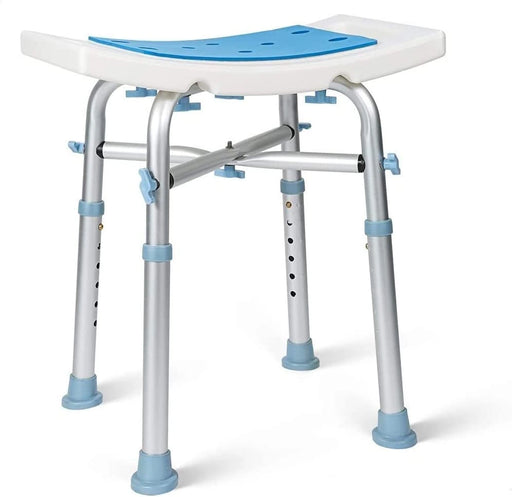 Sale
Sale
Padded & Bariatric - 500LBS Capacity Heavy Duty Shower Stool
Original price $57.99From Original price $36.99Original price $57.99Current price $36.99From $36.99Current price $36.99OasisSpace Medical Heavy Duty Bariatric Shower Stool OasisSpace Medical Heavy Duty Bariatric Shower Stool is approved by the FDA, which is the hig...
View full detailsSaleOriginal price $57.99From Original price $36.99Original price $57.99Current price $36.99From $36.99Current price $36.99 -
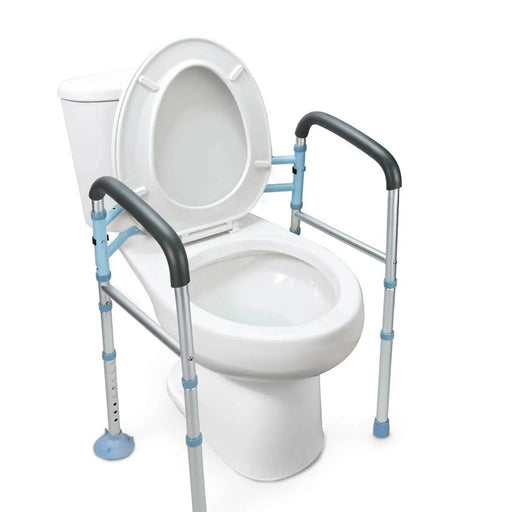 Sale
Sale
300LBS Capacity Stand Alone Toilet Safety Rail
Original price $69.99From Original price $44.99Original price $69.99Current price $44.99From $44.99Current price $44.99OasisSpace Toilet Safety Rails - Fit Any Toilet OaisSpace stand-alone toilet safety rails provide sturdy support for the elderly and people with ...
View full detailsSaleOriginal price $69.99From Original price $44.99Original price $69.99Current price $44.99From $44.99Current price $44.99 -
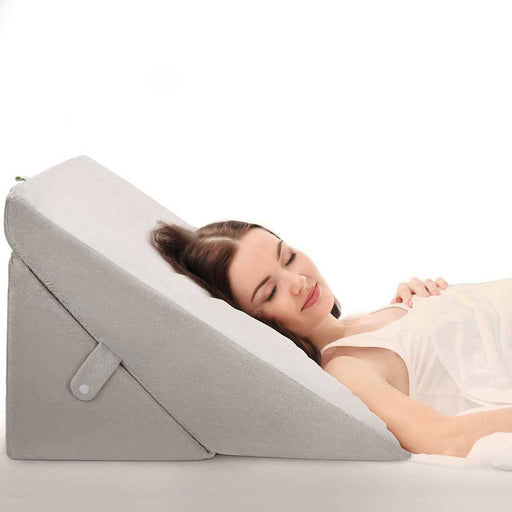
23"x21"x13" Bed Wedge Pillow- Grey
From Original price $69.99Original price$69.99From $69.99Current price $69.997 IN 1 DESIGN FOLDING WEDGE CUSHION THERAPEUTIC. OasisSpace elevated pillow wedges have a foldable design that can change its angle to suit differ...
View full detailsFrom Original price $69.99Original price$69.99From $69.99Current price $69.99








